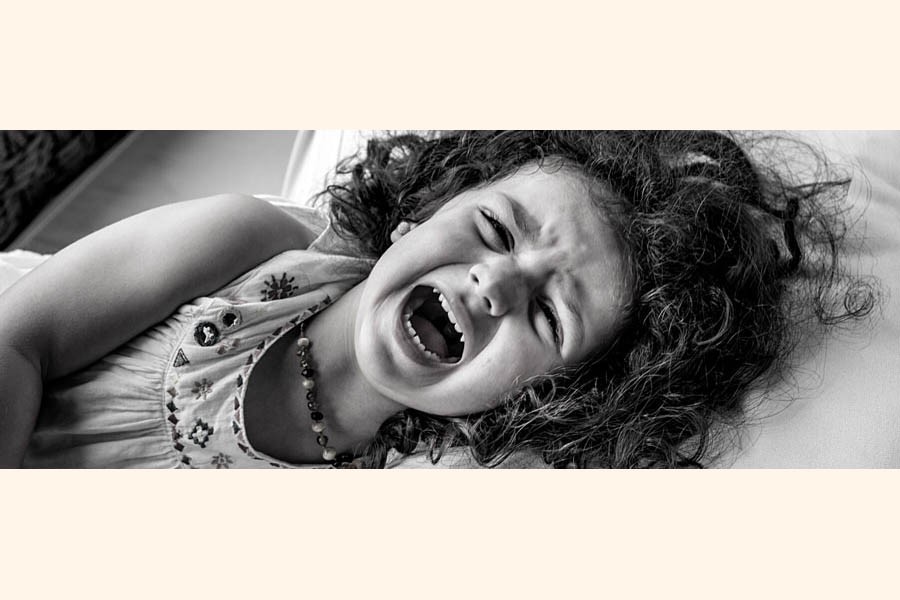
Why children "misbehave" and what to do about it
Sadia Mahjabeen & Jarin Tasnim Diba | Saturday, 5 February 2022

No matter how old a child becomes, undesirable behaviour is likely to continue. Here is why kids misbehave & what parents can do to prevent them:
Is your child sometimes uncontrollably loud? Is he/she stubborn and difficult to deal with? Every time you try to say something, you get a disrespectful response? Back talks? We're discussing the numerous behavioural challenges that parents face on a daily basis. But before finding solution, we need to understand the reason behind these behaviours.
What's the reason behind the bad behaviour? Children use their actions to express how they feel and think. They're often conveying something by their actions that they can't express verbally.
When your child is fearful, nervous, disappointed, or ashamed, their brain detects a threat and reacts. The brain sends hormones and substances all over the body to help fight the threat.
The reasoning part of the brain is temporarily impaired. And your kid can't think straight. The brain is focused on survival and being safe at the time.
What you see on the outside, is a meltdown. Aggression, yelling, lashing out, sobbing, hiding, and beating. What you can't see is an immature, still-developing brain that is overloaded with emotion.
Here are some possible reasons why your child may be acting out:
1. Kids want attention. It's easy to draw attention by throwing a tantrum, whining, or assaulting a sibling. Even if it's negative, kids crave it.
2. Children misbehave frequently when hungry, tired, or unwell. Most toddlers and preschoolers can't express their needs. As a result, they often use their behaviour to show that they have unmet needs.
3. A child may act out because of something that is happening outside of the immediate setting. For example, a child who is being bullied at school may "act out" their anger and frustration by misbehaving at home.
4. Children can learn to behave by watching others. It doesn't matter if it's a classmate misbehaving at school or something they see on TV.
5. If children can get what they want by breaking the rules, they'll quickly realise that misbehaving works.
For example, when a child throws a temper tantrum in a store, and their parents buy them a toy to get them to stop screaming, they learn that temper tantrums are effective.
6. Some teens rebel to show their parents that they can think for themselves. It's possible they're breaking the rules to show grownups they can't be forced to do anything.
7. Some adolescent children "act out" in an attempt to impress their peers.
8. As adolescents, they are attempting to figure out who they are and how they want to act in life. As a result, they are often rebellious and take risks that allow them to cross family, social, and personal boundaries.
10 tips to preventing behaviour Issues before they begin
1. Give your child a lot of positive attention. Give them a few minutes of your undivided attention every day. Have fun and make memories. The closer you are, the more motivated your youngster will be to follow your rules.
2. Listening is key. Let your child finish the story before assisting with the solution. Keep an eye out for patterns of bad conduct. Instead of simply imposing consequences, talk with your child.
3. Only say "no" when it comes to the most important issues, like safety. Place harmful or attractive goods out of reach to reduce the need to say "no". For example -- Instead of saying, "Don't stand," try to say, "Time to sit."
4. As long as your child isn't doing something dangerous and gets plenty of attention for good behaviour, ignoring bad behaviour can be an effective way of stopping it. Ignoring in appropriate behaviour teaches children about the natural repercussions of their actions.
5. Children must be taught to recognise when they do something wrong as well as when they do something well. Notice good behaviour and point it out, praising success and their good efforts. Be specific (for example, "Wow, you did a great job putting that toy away!").
6. Babies pick up on their parents' behaviours, so set an example of the kind of conduct you want to see in your child. Also teach your child to treat others as she/he wants to be treated.
7. Start giving them age-appropriate chores, such as putting their toys away. Give simple, step-by-step directions. Praise them for their efforts.
8. Explain that it's OK to feel mad sometimes, but not to hurt someone or break things. Teach kids positive ways to deal with anger, including talking about it.
9. As your teen gains independence indecision-making, you'll need to balance your unconditional love and support with clear expectations, rules, and boundaries.
10. Don't let yourself or others use physical punishment. If you reside in an area where physical punishment in schools is permitted, you have the right to refuse
We should note that spanking and using harsh words are both harmful and ineffective. This is why:
"Effective Discipline to Raise Healthy Children," an AAP policy statement, emphasizes the importance of focusing on teaching good behaviour rather than punishing negative behaviour. Spanking, slapping, and other types of physical punishment have been shown in studies to be ineffective in modifying a child's behaviour. Yelling at or shaming a child has the same effect. Harsh physical and verbal punishments are ineffective and can harm a child's long-term physical and mental health.
Sadia Mahjabeen is the Founder ([email protected]) & CEO and Jarin Tasnim Diba ([email protected]) works as a Program Expert at iAmMotherly